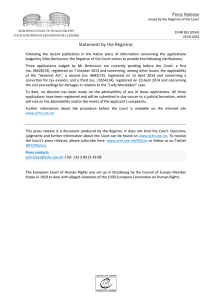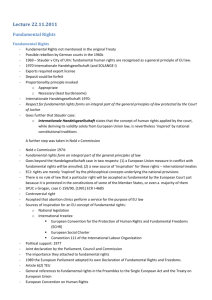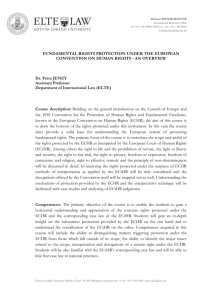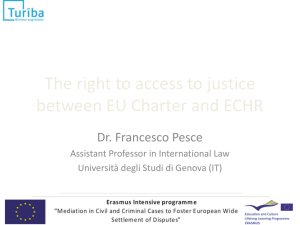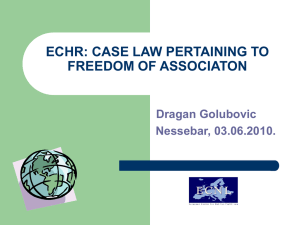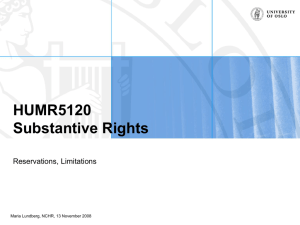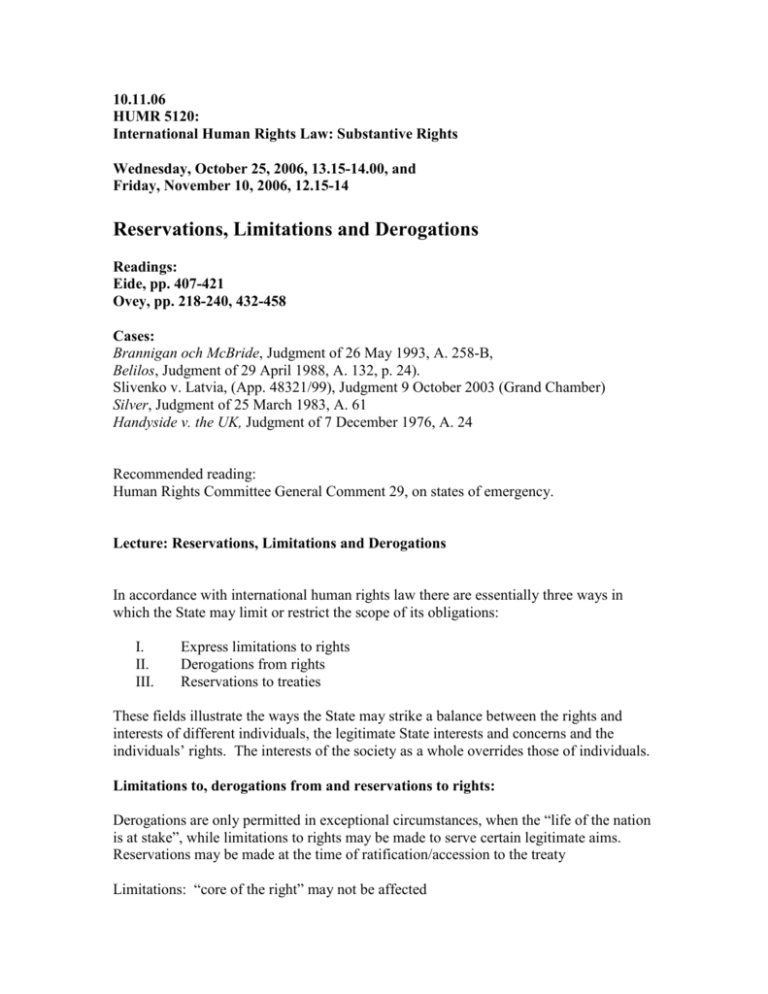
10.11.06
HUMR 5120:
International Human Rights Law: Substantive Rights
Wednesday, October 25, 2006, 13.15-14.00, and
Friday, November 10, 2006, 12.15-14
Reservations, Limitations and Derogations
Readings:
Eide, pp. 407-421
Ovey, pp. 218-240, 432-458
Cases:
Brannigan och McBride, Judgment of 26 May 1993, A. 258-B,
Belilos, Judgment of 29 April 1988, A. 132, p. 24).
Slivenko v. Latvia, (App. 48321/99), Judgment 9 October 2003 (Grand Chamber)
Silver, Judgment of 25 March 1983, A. 61
Handyside v. the UK, Judgment of 7 December 1976, A. 24
Recommended reading:
Human Rights Committee General Comment 29, on states of emergency.
Lecture: Reservations, Limitations and Derogations
In accordance with international human rights law there are essentially three ways in
which the State may limit or restrict the scope of its obligations:
I.
II.
III.
Express limitations to rights
Derogations from rights
Reservations to treaties
These fields illustrate the ways the State may strike a balance between the rights and
interests of different individuals, the legitimate State interests and concerns and the
individuals’ rights. The interests of the society as a whole overrides those of individuals.
Limitations to, derogations from and reservations to rights:
Derogations are only permitted in exceptional circumstances, when the “life of the nation
is at stake”, while limitations to rights may be made to serve certain legitimate aims.
Reservations may be made at the time of ratification/accession to the treaty
Limitations: “core of the right” may not be affected
Derogations: only in exceptional circumstances, and only as far as the situation requires
Reservations: the “object and purpose” of the treaty may not be destroyed
I. Limitations
Balance of legitimate interests
No time limitations
Strict interpretation
Must be necessary in a democratic society – “margin of appreciation”
Proportionality
A list of rights where limitations are permissible:
ECHR
ICCPR
Other provisions of
relevance
Art. 8
Art. 17, 23
Art. 9
Art.18
Art. 4.2 ICCPR
Art. 10
Art. 19, 20
ICERD Art. 4, 4.a)
Art. 11
Art. 21, 22
Art. 8.1.a,c, 8.2
ICESCR, Art. 4.b
ICERD
Art. 2 Protocol 4
Art. 12
Art. 1.2 Protocol 7
Art. 16
Art. 13
Cf. Art. 25 ICCPR
Art. 1 Protocol 1
Art. ICESCR
Rights and freedoms
Private and family
life
Freedom of religion
and belief
Freedom of
expression
Freedom of
assembly and
association
Freedom of
movement/residence
Expulsion of aliens
Political activity of
aliens
Right to property
Economic, social
and cultural rights
NB. The grounds for legitimate restrictions may vary between the different treaties.
Art. 4 ICESCR provides:
“.., the State may subject such rights only to such limitations as are determined by law
only in so far as this may be compatible with the nature of these rights and solely for the
purpose of promoting the general welfare in a democratic society.”
1. Strict interpretation
“It follows from the nature of paragraph 2 of article 10 as an exception clause that this
provision must, according to a universally accepted rule, be strictly interpreted. This is
especially true in the context of the Convention the object and purpose of which is to
safeguard fundamental human rights. Strict interpretation means that no other criteria
than those mentioned in the exception clause itself may be at the basis of any restrictions,
and these criteria, in turn, must be understood in such a way that the language is not
extended beyond its ordinary meaning (cf. paragraph 44 of the Court’s judgment of 21
February 1975 in the Golder case ...)”
“In the case of exception clauses such as … the principle of strict interpretation meets
certain difficulties because of the broad meaning of the clause itself. It nevertheless
imposes a number of clearly defined obligations on the authorities of the High
Contracting Parties …” (Sunday Times case, Report of the Commission, B. 28, paras.
194-195)
1. Proportionality of interference in relation to a legitimate aim
2. Only a minimum interference to secure the aim
2. Permissible limitations
Criteria:
a. Lawful: “in accordance with the law” or “prescribed by law”
b. Legitimate: aims listed in the provisions
c. Necessary in a democratic society
2.a. Lawful: “in accordance with the law” or “prescribed by law”
What s considered to be “law” should not be given a restrictive interpretation. It includes,
“common law” and administrative regulations and international treaties. The Sunday
Times, Judgment of 26 April 1979, A.30, s. 30; Barthold, Judgment of 25 March 1985, A.
90, s. 21-22, Slivenko v. Latvia, (App. 48321/99), Judgment 9 October 2003 (Grand
Chamber)
“clear, accessible, precise and foreseeable” without being “excessive rigidity” (The
Sunday Times, Judgment of 26 April 1979, A.30, para. 49).
For the quality of the “law” see:
Malone v. the UK, Judgment of 2 August 1984, Ser. A, No 82
Halford v. UK (App. 20605/93), Judgment of 25 June 1997
Leander v. Sweden, Judgment of 26 March 1987, Se. A, No. 116
2.b. Legitimate – aims listed in the provisions
Some difference in aims in different provisions. BUT generally broadly worded
Examples of aims in the case law of ECHR:
“national security”
“public safety”
“public order”
“prevention of crimes”
“morals”
“health”
“the reputation of others”
“the protection of the rights of others”
“the economic welfare of the country”
“the prevention of disclosure of information received in confidence”
“the guaranteeing of the impartiality of the judiciary”
“the prevention of disorder and crime”
2.c. ”necessary in a democratic society”
“not synonymous with “indispensable” … neither has it the flexibility of such
expressions as “admissible”, “ordinary”, “useful”, “reasonable”, or “desirable”.
The ECHR has interpreted this requirement as a “pressing social need”,
and proportionality is required in relation to the stated aim
Handyside v. the UK, Judgment of 7 December 1976, A. 24, paras.48-49; Silver,
Judgment of 25 March 1983, A. 61, paras. 97-98.)
The ECHR relies on the State’s “margin of appreciation” to a larger or lesser extent
depending on the nature of the rights or on the balancing of the competing claims.
Handyside v. the UK, Judgment of 7 December 1976, A. 24, paras.26, 48
For the different interpretations of the extent of the “margin of appreciation” in the case
law, see Ovey and White, pp. 234-239.
II. Derogations:
A derogation measures are only allowed in exceptional circumstances and should be of
temporary nature.
Only in a situation when the “life of the nation” is at stake, States may unilaterally
derogate from some of its obligations.
Exceptional circumstances
Non-derogable rights
Strictly required – proportionality
Temporary
Procedure – international and domestic
Applicable law during emergencies: Humanitarian law and international criminal
law and parts of international human rights law
See:
Art. 4 ICCPR, Art. 15 ECHR, ECHR Protocol 6, Art. 3.
1. WHEN?
War and state of emergency
Threat to the existence of the State
Lawless case (ECHR):
“an exceptional situation or crisis of emergency which affects the whole population and
constitutes a threat to organised life in the community of which the State is composed”
See kommissionens rapport, 19 Dec 1959, B.1 (1961), p.. 82, and, Judgment of 1 July
1961, s. 56)
In Greece v. the UK the Commission and the Court developed the criteria for scrutiny:
1.
2.
3.
4.
It must be actual or imminent.
Its effects must involve the whole nation.
The continuance of organised life in the community must be threatened
The crisis or danger must be exceptional, in that the normal measures or restrictions,
permitted by the Convention for the maintenance of pubic safety, health and order, are
plainly inadequate.
See report of the Commissionen, 5 November 1969, YB XII (1969), p. 72 and pp.. 76,
100 (also pp. 45-71)
2. HOW?
2.a. Non-derogable rights
Derogations may neither be contrary to other obligations under international law
nor to the rights which are listed as “non-derogable” under Art 15 of the ECHR or
Article 4 of the ICCPR. (for an interpretation of which rights are non-derogable
under international law, see Human Rights Commttee Gen. Comment 29, on
states of emergency)
A number of rights are non-derogable according to Art. 4 ICCPR and Art. 15
ECHR
i.
Art. 15 ECHR: Art.2 (life), Art. 3 (torture), Art. 4.1 (slavery), art.7 (no
punishment without law)
No exceptions to Art. 3 and Art.4.1.
ii.
iii.
iv.
Qualified in relation to life,”lawful acts of war”, see also Protocol 6, Arts. 2
and 3
NB. The content of Art. 6 ICCPR and Art. 2 ECHR should be compared
Non-derogable rights in Art. 4 ICCPR also include:
i.
Art 11 (prison upon non-fulfilment of contractual obligation) and
ii.
Art 18 (thought, concience and religion)
2.b. Non-discrimination is included in Art. 4.1 “on the grounds of race, colour, sex,
language, religion and social origin”. However, art 14 ECHR is an integral part of all
rights (Ireland v. the UK, s. 86-88, para.228-232 )
2.c Derogations may not contradict other human rights obligations, whether contained in
national or international law, see Art. 53 ECHR
Take note of the obligations under ICESCR, international humanitarian law and
international criminal law . See Eide, pp. 407-421
States which are bound by both the ECHR and the ICCPR Brannigan och McBride,
Judgment of 26 May 1993, A. 258-B, s.56-57; Lawless, s. 60, Ireland v. the UK, s.84 och
i förklarat att inga bevis har funnits på att avvikelserna strider mot andra folkrättsliga
bestämmelser.
2.d. Necessary in a democratic society
In relation to the “margin of appreciation”
Ireland v. the UK, Judgment of 18 January 1978, A. 25, s. 78-79, 81-82, 92-93; Lawless,
Merits, Judgment of 1 July 1961, A. 3, s. 55-56.)
See also Brannigan och McBride, Judgment of 26 May 1993, A. 258-B, s. 29, 33, 40-42
for critique of the wide margin of appreciation
Art. 15 ECHR: Measures should be “strictly required” in relation to the situation,
Lawless, Judgment, s. 58, para. 36, Ireland v. the UK, Judgment, s. 80-81, para. 212,
Brannigan and McBride, s.53-54, para. 56-60..
2.e. Proportionality
“the rule of law”,
Lawless, s.58, para.36; Ireland v. the UK, s. 81, para. 212; Brannigan v. McBride, s. 5354, para. 56-59.
3. FOR HOW LONG?
3.a Temporary
Brannigan and McBride, p. 52
The validity of the derogation cannot be called into question for the sole reason that the
Government had decided to examine whether in the future a way could be found of
ensuring greater conformity with the Convention obligations. Indeed, such a process of
continued reflection is not only in keeping with Article 15 para. 3 which requires
permanent review of the need for emergency measures but is also implicit in the very
notion of proportionality.
4. LAWFUL or NOT?
4.a Requirements in Article 4 of ICCPR and Article 15 of the ECHR
And in the domestic legal order
Brannigan och McBride, Judgment of 26 May 1993, A. 258-B, s.56-57; Lawless, s. 60,
Ireland v. the UK, s.84
4.b A balance between State discretion and the supervisory organs’ competence
The requirements for a permissible derogation under ECHR and the ICCPR are tested by
the Court or the Committee despite the recognized margin of appreciation of states to
determine their situation and which necessary measures to adopt.
See Ireland v. the UK, Judgment of 18 January 1978, A. 25, p. 78-79, 81-82, 92-93;
Lawless, Merits, Judgment of 1 July 1961, A. 3, p. 55-56. and cf. Gen. Comment 29, on
states of emergency, para. 5)
“Margin of appreciation” discussion in Brannigan och McBride, Judgment of 26 May
1993, A. 258-B, p. 29, 33, 40-42)
See the Human Rights Committee’s General Comment Comment No.29, on states of
emergency.
…..
III. Reservations
a.
b.
c.
d.
1. The ECHR
Addresses reservations in Art. 57 ECHR:
Only if law in force is not in conformity with the ECHR
Only if not of a general character
Only if a short description of the law is provided
Only if it is made at time of signature or depositing the ratification
The ECHR is competent to consider whether a reservation is permitted or not
according to the ECHR, Belilos, Judgment of 29 April 1988, A. 132, p. 24
A reservation may not be ”general” see Belilos, p. 26, para.55:
“By “reservation of a general character” ... is meant in particular a reservation couched
in terms that are too vague or broad for it to be possible to determine their exact
meaning and scope. ... Article 64§1 requires precision and clarity.”
A short description of the law is required it contributes to “legal certainty”
[T]he “brief statement of the law concerned” both constitutes an evidential factor and
contributes to legal certainty. The purpose of Article 64 § 2 is to provide a guarantee ...
that a reservation does not go beyond the provisions expressly excluded by the State
concerned.( Belilos, p. 27)
Compare the Chorherr case ( Judgment of 25 August 1993, Ser. A. 266-B)
2. The ICCPR
Does not contain any specific rule.
Art. 19 Vienna Convention on the Law of Treaties provides the general rules
applicable to reservation
See also Reservations to the Convention on Genocide, Advisory Opinion: I.C.J. Reports
1951, for a discussion on the possibilities of making reservations to the Genocide
Convention


